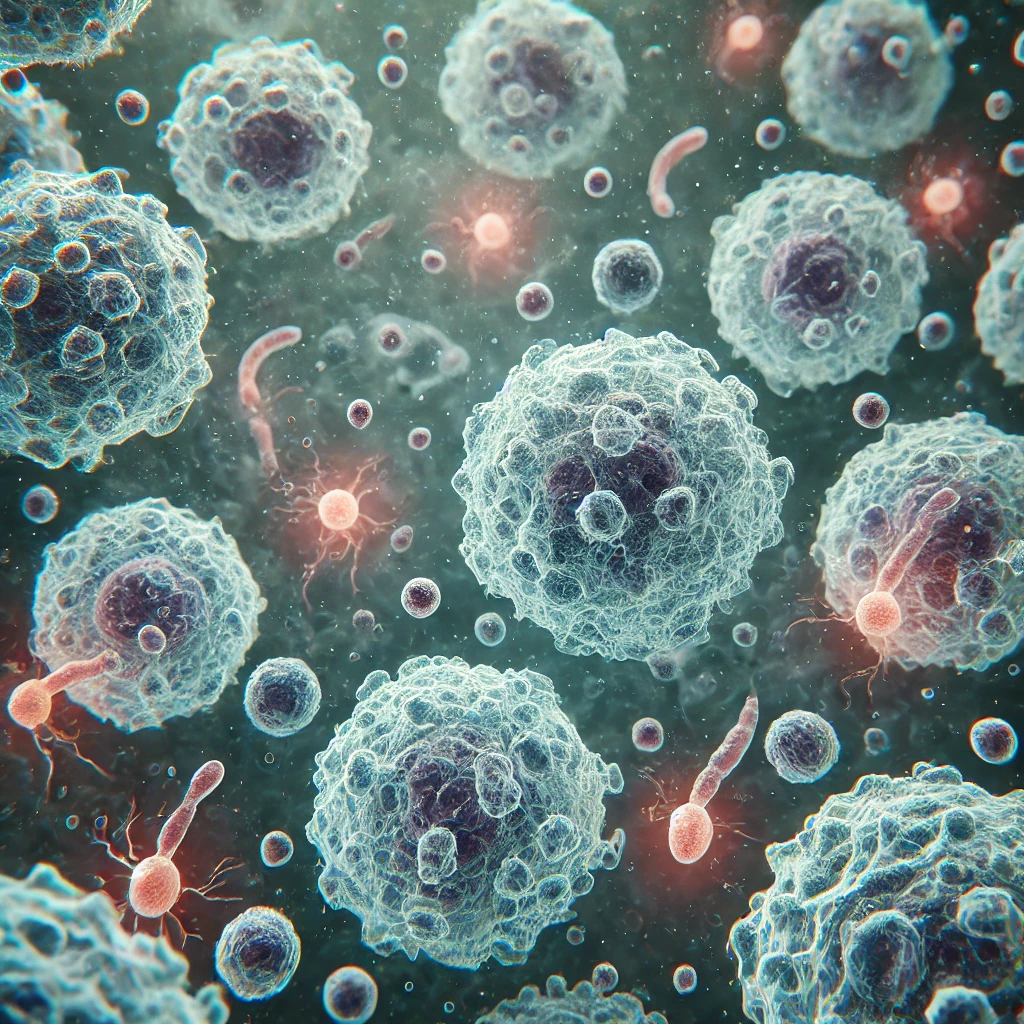
Members
















About
Natural Killer Cells and Anti-Tumor Immunity
Within the ecosystem that constitutes our body, NK cells are formidable and highly selective predators: in just a few hours, they kill tumor or infected cells while sparing healthy cells.
In several laboratories around the world, scientists have joined forces to understand how these killers eliminate their targets, and only them, even though they lack the highly selective antigen receptors of their close cousins, T lymphocytes.
Today we know not only how NK cells are controlled but also how they, in turn, control other agents of the immune system. The story of NK cells is far from over, however... attempts are being made to manipulate NK cells to treat cancer.
N for Natural, K for Killer, as its name suggests, the NK cell is above all a killer cell. With its congeners from the innate immune system (polymorphonuclear leukocytes, monocytes, macrophages, dendritic cells and Tγδ lymphocytes), it patrols the body and identifies cancerous or infected cells. Once identified, the diseased cell is destroyed in a few minutes by a so-called cytotoxic mechanism: the NK cell attacks it hand-to-hand, releasing substances that pierce the "skin" of its victim, resulting in death by lysis. At the same time, the NK cell secretes cytokines (the "hormones" of the immune system) which stimulate and direct the response of other agents of innate immunity, particularly lymphocytes of the adaptive immune system.
How does the NK cell distinguish between a diseased cell and a healthy cell? Eric Vivier's team made a significant contribution to solving this enigma in the mid-1990s.
DURING EVOLUTION, THE NK CELL SIMPLY LEARNED TO COUNT!
“To discriminate between normal and pathological, the NK cell has developed a very sophisticated detection system " emphasizes Eric Vivier. " It relies on surface radars coupled with intracellular signaling pathways that transmit information to the cell nucleus so that the cell can make its decision: to kill or not to kill. Among these radars, we distinguish activating and inhibitory receptors. The former detect danger signals emitted only by stressed cells and put the NK cell in “extermination” mode. The latter detect self-molecules (called Major Histocompatibility Complex class I or MHC I) specific to all healthy cells of each individual and deactivate the cytotoxic function of the NK cell: the target is spared and the predator can then resume patrolling.”
However, most of the time, the NK cell receives these antagonistic signals simultaneously. In this context, how does it manage to make its decision? “During evolution, she simply learned to count!” says Eric Vivier. “The NK cell performs the sum of the signals it receives: it spares healthy cells that send it inhibitory signals and few or no activating signals, while killing cancerous or infected cells that not only deliver “danger signals” but have also become incapable of sending protective inhibitory signals. In short, the NK cell functions like an ideal drug: effective and non-toxic.”
In reality, our NK cells are not always able to effectively combat the pathogens and cancers we face. Hence the idea of leveraging these discoveries to stimulate their activity. Thanks to monoclonal antibodies, several strategies are possible. Some of these approaches are being developed by Innate Pharma, a company founded in 1999 based on the work of Alessandro Moretta, Professor at the University of Genoa, and Eric Vivier. These antibodies are currently being evaluated clinically in cancer and inflammatory diseases.
NET
New therapies that stimulate antitumor immunity have been developed over the past decade. These therapies have primarily aimed to stimulate T lymphocytes, a type of white blood cell that plays a major role in the adaptive antitumor response. Although these therapies have achieved unprecedented success, they only work in a minority of cancer patients, highlighting the need to identify new cells and molecules that could be exploited in the next generation of “immunotherapies,” i.e., therapies that mobilize immunity. Harnessing so-called “innate” immunity is emerging as a promising therapeutic approach to improve the efficacy of anticancer treatments and overcome resistance to current immunotherapies targeting T lymphocytes. In particular, the use of NK cells in cancer patients has the dual advantage of inducing tumor cell elimination and participating in a multicellular immune response against tumor cells. Correlations have been observed between the clinical outcome of patients and NK cell infiltration at the tumor bed or with peripheral NK cell cytotoxicity.
The objective of our team is to dissect the role of NK cells and their close relatives, type 1 innate lymphoid cells (ILC1s), in different cancer pathologies with the aim of proposing innovative treatments in these diseases based on their manipulation using antibody-based drugs.
Projects
Project: Treating Breast Cancer Breast cancer is the most frequently diagnosed cancer in women in […]

Project: TREATLIVMETS Liver metastases occur in nearly 50% of cancer patients, particularly in […]

Project: PIONeeR Lung cancer is the leading cause of cancer death, with more than 1.5 million […]






